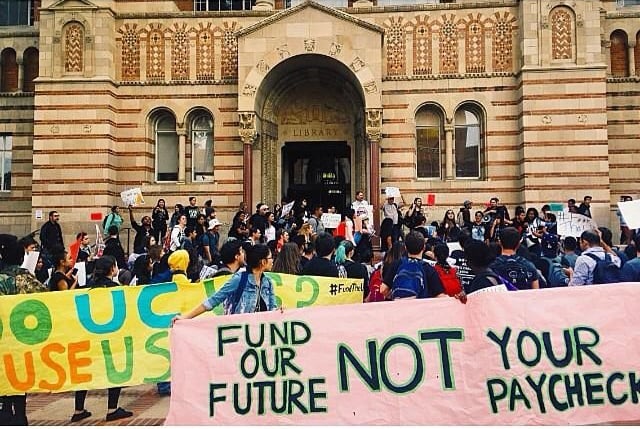You have /5 articles left.
Sign up for a free account or log in.

Photo by Courtney Cecale
University of California administrators are prepared to raise tuition 27 percent by the end of the decade, despite the objections of students and the state’s popular governor.
The debate over the increases for the 10-campus system’s 244,000 students has set up a showdown between the state’s politicians, the Board of Regents and students.
The full board is set to vote on tuition increase today, although the proposal already cleared a key committee on Wednesday. California Governor Jerry Brown, who made tuition freezes part of his successful re-election campaign, opposes the increases and rolled out his own proposal to cut costs, which emphasizes three-year degrees and online education.
System President Janet Napolitano’s tuition plan calls for up to five consecutive years of 5 percent increases. They would raise in-state tuition and fees from $12,192 now to $15,564 by fall 2019. The plan’s backers portray the increases as modest, predictable and necessary to ensure the quality of the system.
Opponents of the tuition increases – students and the current or former politicians who sit on the board – argue that higher fees won’t solve the system’s long-term problems and will hurt students. They also accuse Napolitano and the regents of playing politics and using students as hostages in a budget battle with Brown, who is a member of the Board of Regents. Napolitano has promised to admit more Californians and keep their tuition lower if state lawmakers will give the system hundreds of millions more dollars.
Napolitano argues that her plan would end the volatility of tuition increases in the state. Depending on when in recent history a UC student arrived on campus, he or she could have had flat tuition the whole time or seen tuition double.
“For far too long, in my judgment, the university has operated on a year-to-year basis,” Napolitano, who took office last fall, said during Wednesday’s regents' meeting.
The tuition hikes don’t take effect if the governor and the legislature agree to send hundreds of millions more to the university system over the next several years. Brown said the university needs to find a way to control its costs.
“There is not a scarcity here that is impossible to live with,” Brown said.
An Online Solution?
Brown proposed a new commission to study the future of the UC system during Wednesday's meeting of the Committee on Long Range Planning. The governor said he wants the commission to study five things, including expanded online education, offering three-year degrees and offering credits for students who can prove they are competent in certain subjects.
Napolitano called Brown’s proposal “very significant” one minute and then gently dismissed it a few minutes later.
Napolitano, a former governor of Arizona, suggested she didn’t have much appetite for a massive push into online education when she compared UC to Arizona State University, a public university with a juggernaut online education program. Arizona State’s model, Napolitano said, “doesn’t really comply with the mission, purpose and role of the University of California."
Sadia Saifuddin, the student regent on the board, said she opposed both the tuition increases and Brown’s effort to supplant students’ on-campus education with online education.
“You know what, students have always been taken hostage,” said Saifuddin, a University of California at Berkeley student who said she had to work four jobs to make ends meet. “Let’s just be real about the situation – students have always had to pay the price of economic mismanagement by the regents and the state.”
Student protesters from across the state tried to block doors to the meeting in San Francisco and drown out the ayes and nays. At one point, in a classic scene that could have happened during any number of UC contretemps over the years, Regent Norman Pattiz wagged his finger at the protesting students. Then, minutes later, he voted to increase their tuition.
Besides Saifuddin, other regents accused Napolitano and tuition increase supporters of using students as pawns in a budget battle.
“If you come in in a hostage-taking posture that says, ‘Either give us x, or this is what we’re going to do to our students,’ it’s not the most effective way to go about it,” said board member John Pérez, a former speaker of the California Assembly who Brown appointed to the board just ahead of this week’s debate.
UC officials have said the tuition increases would allow them to enroll 5,000 more California students over the next five years. If the increases don’t pass and the state doesn’t pitch in millions more, the officials said, they might start turning away more Californians and increasing the number of out-of-state students, who pay higher tuition. This year, a fifth of UC students came from outside California -- the most in the system's history. Resentment among Californians is now forcing UC officials to reconsider their out-of-state student strategy.
Regent Bonnie Reiss, a former state secretary of education, backed the tuition increases, and said it was not anyone’s intention to hold students hostage. Then she added, “It may not be good to negotiate this way, but it’s not good to negotiate any other way either.”
Lieutenant Governor Gavin Newsom, a regent who opposes the tuition increases, accused Napolitano’s side of playing politics and doing so poorly. He said the UC administration didn’t really bother presenting its tuition plan to students or even members of the board before it was released.
“It was baked,” Newsom said, of the tuition plan.
Newsom said he first learned about the proposal from a newspaper reporter. Only after he heard from the reporter did UC’s chief financial officer call to tell the lieutenant governor more about the plan.
The goal of the tuition increases is for UC to insulate itself from fluctuations in the state appropriations, but Brown said that can never be done. Brown, who began examining UC’s budgets 40 years ago when he was elected to his first stint as governor, said the system – a crown jewel of public higher education in America – cannot save itself with money alone.
“Your tuition cannot stop the boom-and-bust out there,” Brown said. “And when the state gets hard-pressed and has to face its mandatory costs, it will cut back again. So whatever we say today, you’ll still have to reserve and prepare against the inevitable downturns.”
That’s why he’s pushing new business models – some of which are sure to raise faculty opposition. Brown has already tried and sometimes failed to make California a proving ground for online education. A push to put more UC courses online has not met much success.
Christopher Newfield, a professor of English at the University of California at Santa Barbara who co-edits the blog Remaking the University, said Brown’s proposal is full of ideas that either are going nowhere or are doable but already being worked on by UC.
“It’s all the old ideas that have never worked rolled into one,” Newfield said.
The expansion of online courses, in particular, may be a hard sell. Not only have efforts not worked before, but students who get into a UC want to be on campus.
Jefferson Kuoch-Seng, a student from the University of California at Merced and president of the UC Student Association, said students are now prepared to begin lobbying Brown and the legislature for more money to avoid tuition increases.
The legislature’s appetite and ability to increase funding is questionable, but Assembly Speaker Toni Atkins, also a member of the Board of Regents, rolled out her own plan Wednesday to avoid tuition hikes. She would put $50 million more into UC, increase a state scholarship for needy students, raise tuition on out-of-state students by $5,000 and reform the system’s pension fund.
UC regents accuse Brown of reneging on his commitments to fund the system with money from Prop 30, a statewide tax increase that passed in part because of lobbying by college students who were told to fear steep cuts to higher education without more taxes.
Brown said the new taxes have given UC $650 million this year that it wouldn't have had without Prop 30.
“It may not be as much as you want, but it’s real money, so everyone who worked on that, you know, it’s wonderful that they did because without it we’d be in real trouble,” the governor said.





